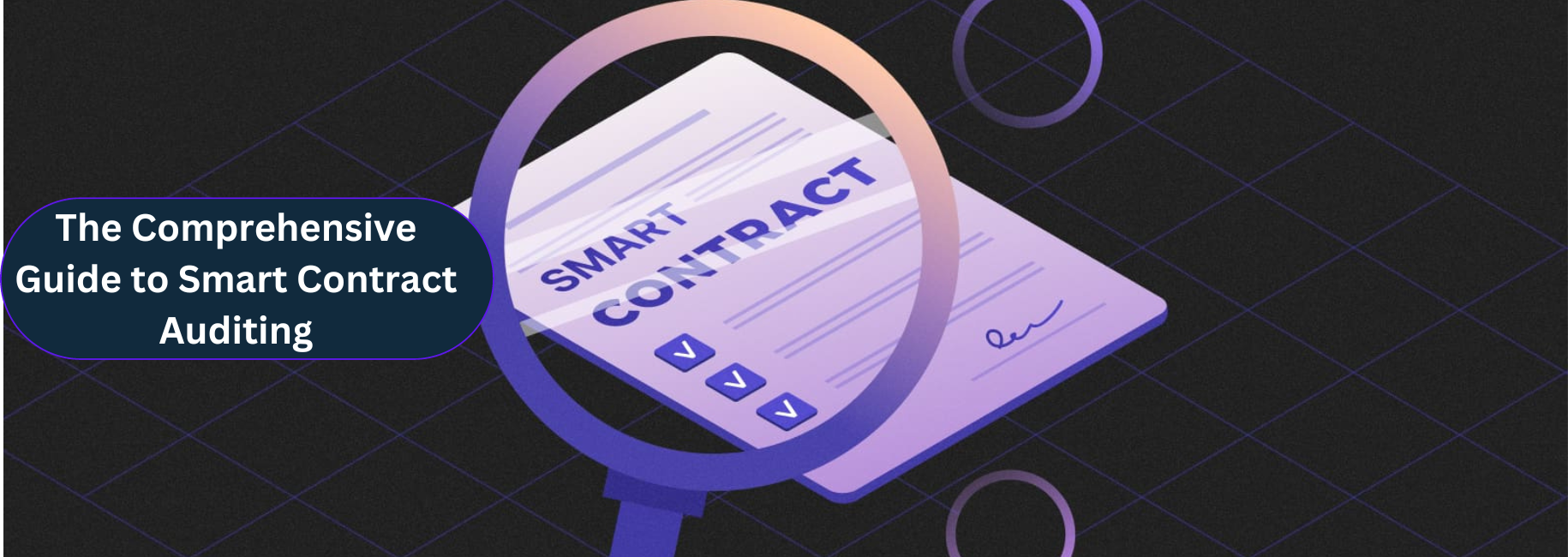Smart contract audits stand as the guardians of blockchain integrity. These meticulous reviews explore the code that powers decentralized applications, seeking out vulnerabilities before they can be exploited.
Their precision ensures that smart contracts do what they promise, safeguarding users’ digital assets and trust.
As a cornerstone of blockchain technology and security, smart contract audits are not just a luxury but a necessity.
In 2024, a single smart contract flaw resulted in a $600 million cryptocurrency heist. This underscores the critical need for thorough audits.
Alternatives to smart contract audits exist, but none match their level of detail and security assurance.
The forthcoming content will peel back the layers of smart contract audits, exploring their significance, the process, and how they continue to evolve.
Contents
- 1 What Is a Smart Contract?
- 2 Smart Contract Vulnerabilities
- 3 What is a Smart Contract Audit?
- 4 Why Is a Smart Contract Audit Necessary?
- 5 Types of Smart Contract Audit
- 6 The Smart Contract Auditing Process
- 7 What Smart Contract Vulnerabilities Does a Smart Contract Audit Address?
- 8 Classification of audits’ findings
- 9 Audit Findings Difficulty/Likelihood
- 10 Important Audit Techniques
- 11 What Technologies Does Webisoft Use to Audit Smart Contracts?
- 12 Conclusion
- 13 Frequently Asked Questions
What Is a Smart Contract?
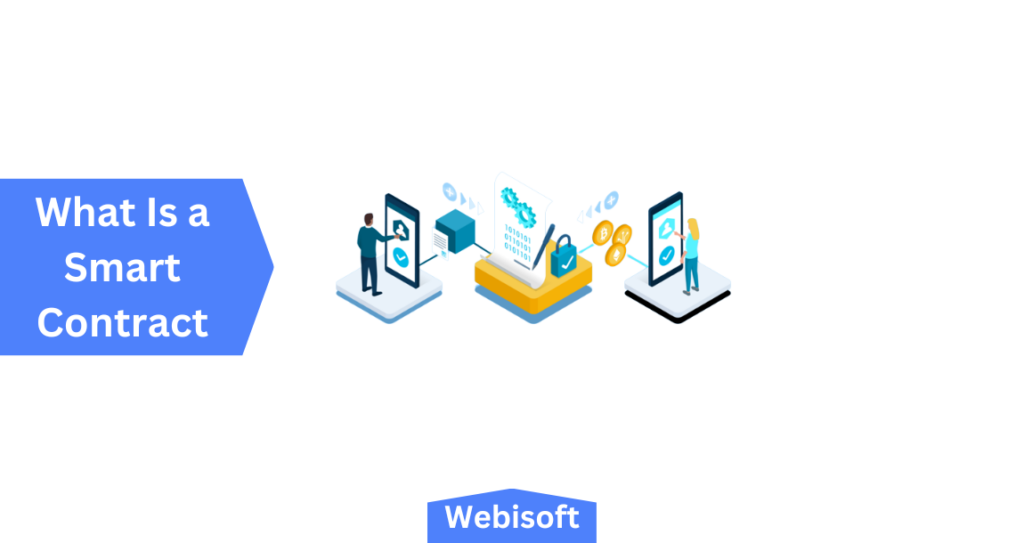
Smart contracts are self-executing contracts with the terms written directly into code. They run on blockchain networks, automating agreements without intermediaries. When predefined conditions are met, the contract executes the corresponding terms.
Blockchain technology powers these digital contracts, ensuring transparency and immutability. Parties can trust the execution without needing a third party.
Smart contracts can manage agreements, from simple transactions to complex decentralized applications.
Developers code smart contracts to trigger actions like transferring funds or issuing tickets. They have become essential in fields like finance, real estate, and law.
By using smart contracts, efficiency skyrockets, eliminating manual processing and reducing errors.
Smart Contract Vulnerabilities
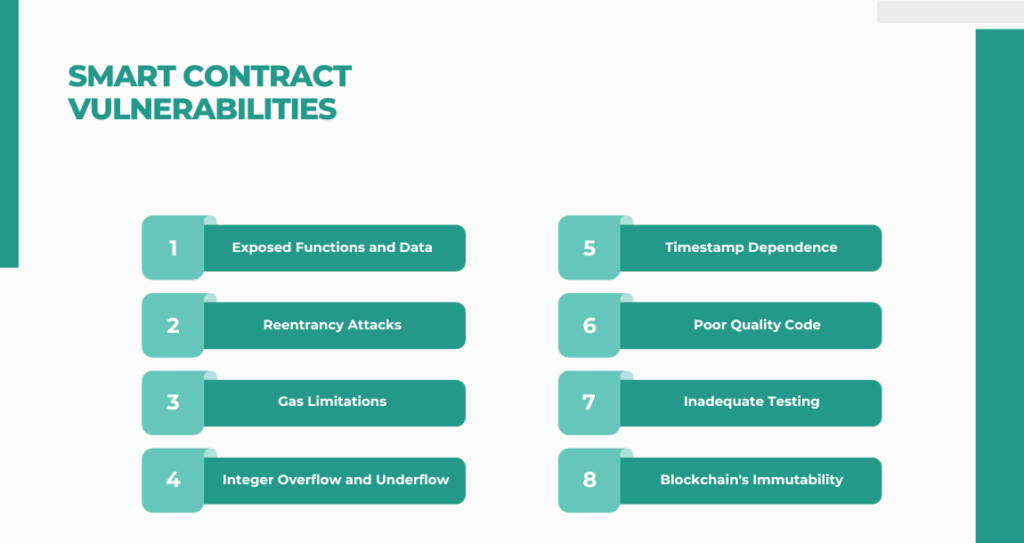
The vulnerabilities associated with smart contracts are:
Exposed Functions and Data
Some smart contracts have functions that are publicly accessible. Malicious actors exploit these, leading to unauthorized actions.
Reentrancy Attacks
A common issue where attackers repeatedly withdraw funds before the original transaction is finalized.
Gas Limitations
Contracts can run out of gas if poorly designed, halting transactions and potentially freezing funds.
Integer Overflow and Underflow
These occur when arithmetic operations reach the maximum or minimum size of a variable, leading to unexpected behavior.
Timestamp Dependence
Relying on block timestamps can be risky; miners can manipulate them, affecting contract outcomes.
Poor Quality Code
Rushed or untested code can lead to overlooked vulnerabilities, making the contract susceptible to attacks.
Inadequate Testing
Without thorough testing, contracts may go live with undetected flaws, posing serious risks to users and funds.
Blockchain’s Immutability
Once deployed, amending a smart contract is not straightforward. Bugs or vulnerabilities in the code can be costly.
What is a Smart Contract Audit?
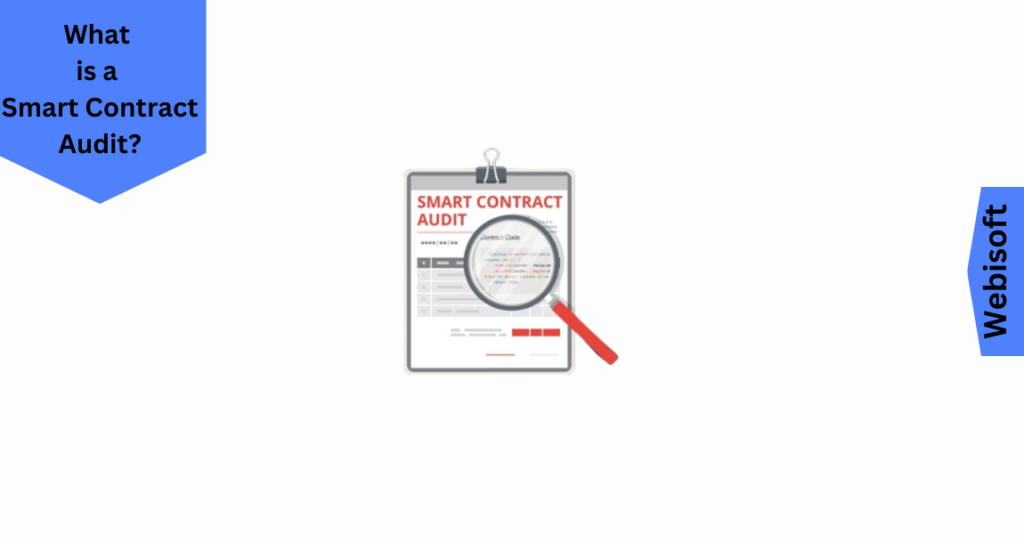
An automated smart contract audit is a thorough inspection of the code powering a smart contract.
Experts scrutinize the contract’s code to identify security flaws, vulnerabilities, and inefficiencies. It’s like a safety check to ensure the contract will do what it’s supposed to do, without any hitches.
Auditors use their expertise to confirm the contract’s logic is sound and secure. They pore over the code line by line.
Tools and manual checks help them uncover hidden issues. The goal is to make the contract bulletproof against hacks and errors.
During an audit, auditors also check for adherence to best practices. They ensure the code is clean, well-documented, and maintainable. A detailed report follows, highlighting any issues and recommending fixes.
Why Is a Smart Contract Audit Necessary?
Smart contract audits are vital for multiple reasons, which can be broken down into detailed points:
Safeguarding Investments
Smart contracts often handle significant amounts of money. A flaw in the code could lead to loss of funds, either through theft or a malfunction. Audits act as a preventative measure, identifying weaknesses before they can be exploited.
Reinforcing User Confidence
When people know a contract has been audited, they’re more likely to trust and use it. This trust is crucial for any platform looking to attract and retain users.
Upholding Standards
Contracts must comply with legal and industry-specific guidelines. Auditors check for compliance, which is essential for the contract to be taken seriously and widely accepted.
Early Bug Detection
The earlier a problem is found, the easier it is to fix. An audit can catch issues before the contract goes live, avoiding costly amendments and potential disputes in the future.
Improving Code Quality
Feedback from audits can greatly improve the quality of the smart contract code. It ensures that the code is not just functional but also efficient and optimized for performance.
Protecting Brand Image
A security breach can be disastrous for a company’s image. By ensuring that smart contracts are secure, audits help maintain and protect the brand’s reputation.
Encouraging Innovation
Knowing that a safety net exists allows developers to innovate with confidence. They can push boundaries, knowing that auditors will check their work for any potential risks.
A smart contract audit is a crucial step in the development process. It ensures the reliability and security of the contract, protects the interests of all parties involved, and upholds the integrity of the blockchain ecosystem.
Without audits, the very foundation of trust that blockchain technology is built on becomes shaky, making such reviews not just necessary but indispensable.
Types of Smart Contract Audit
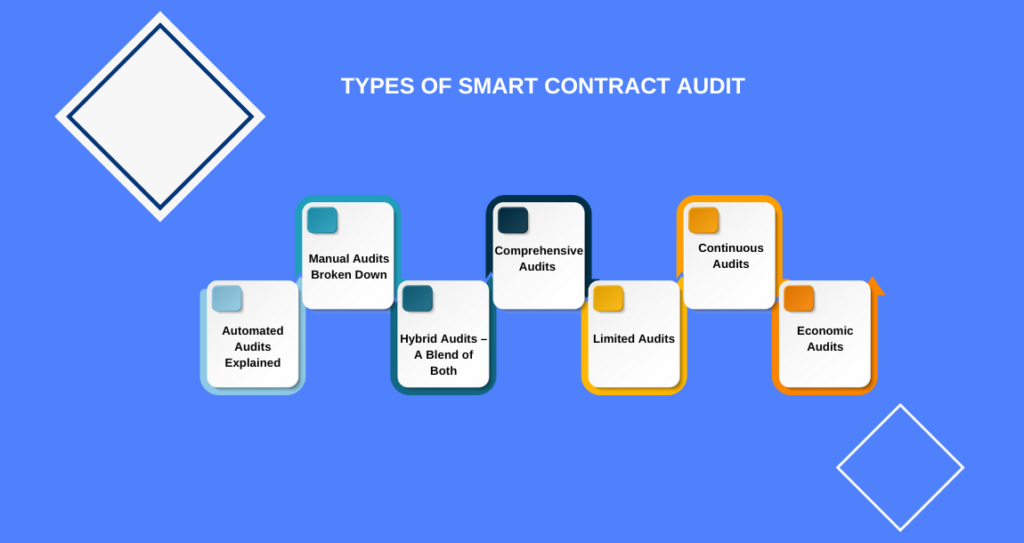
The types of smart contract audit are:
1. Automated Audits Explained
Here, specialized software scans the contract’s code. The smart contract audit example shows patterns that match known vulnerabilities. It’s like a spellchecker that catches common errors but might miss the more sophisticated ones.
2. Manual Audits Broken Down
In manual audits, experienced auditors examine each part of the code carefully. They think like hackers to spot potential security risks. It’s a meticulous process, akin to proofreading a novel where context and nuance matter.
3. Hybrid Audits – A Blend of Both
Combining the speed of automated checks with the insight of manual review, hybrid audits provide a thorough examination. It’s the best of both worlds, offering a more complete analysis.
4. Comprehensive Audits – The Deep Dive
These audits look at everything. Beyond the code, they evaluate how the contract fits within the broader system. It’s a full health check-up, ensuring every part of the contract functions well with others.
5. Limited Audits – Quick Scans
When time or resources are short, limited audits focus on key contract aspects, such as particular functions or security features. Think of it as a routine car service, where only essential systems are checked.
6. Continuous Audits – Ongoing Vigilance
As smart contracts can be updated or changed, continuous audits are regular checks that ensure new updates haven’t introduced any flaws. It’s like having a security guard on duty, always watching.
7. Economic Audits – Beyond the Code
These audits examine the economic principles governing the contract’s operations. They ensure the contract encourages the right behaviors and that the economics don’t lead to unintended consequences.
The Smart Contract Auditing Process
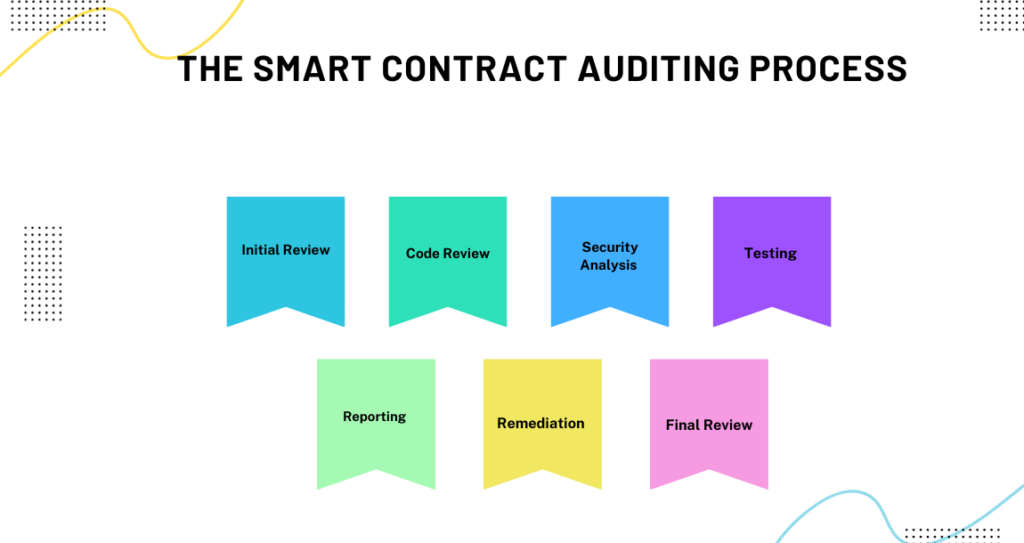
Each type of audit and step in the process plays a crucial role in ensuring a smart contract is secure, efficient, and trustworthy. A thoroughly audited smart contract can protect users’ assets and help maintain the integrity and reliability of the blockchain platform it operates on.
Initial Review – Setting the Stage
Auditors start by getting a clear picture of what the smart contract is meant to do. They look at its design and try to understand its purpose, setting the stage for a focused review.
Code Review – The Inspection
Here, the code is put under a microscope. Automated tools flag potential issues, and auditors use their expertise to investigate further, examining the logic and structure of the code.
Security Analysis – The Probe
The security probe is about finding weak spots. Auditors test for various security breaches to see if there’s a way for someone to exploit the contract.
Testing – The Trial
The contract undergoes rigorous testing, where auditors create different scenarios to see how the contract behaves. It’s like a fire drill, ensuring the contract can handle unexpected situations.
Reporting – The Findings
Once testing is complete, auditors compile their findings into a report. This document lays out any problems found and suggests how to fix them.
Remediation – The Fix
With the audit report in hand, developers make repairs. They tweak the code to seal up the vulnerabilities and improve the contract’s performance.
Final Review – The Seal of Approval
Finally, auditors take another look to make sure all fixes are in place. They give the green light if everything checks out, confirming the smart contract is secure and ready to go live.
What Smart Contract Vulnerabilities Does a Smart Contract Audit Address?
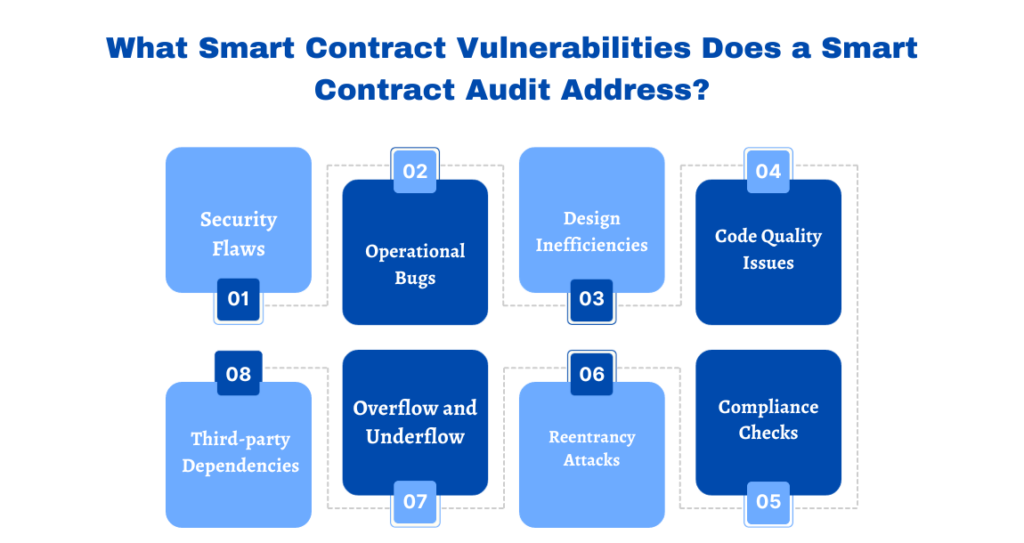
Smart contract audits focus on a range of potential risks. These risks can compromise security, functionality, and trust. Below are the vulnerabilities commonly addressed in an audit:
Security Flaws
Auditors scrutinize contracts for security loopholes that hackers might exploit. They seal these gaps to thwart unauthorized access and fund theft.
Operational Bugs
These are errors that affect how a contract operates. Auditors work to ensure that each function behaves as intended.
Design Inefficiencies
Sometimes a contract may work, but not well. Auditors refine the logic to boost efficiency and reduce transaction costs.
Code Quality Issues
High-quality code reduces the risk of future errors. Audits review the coding practices to enhance readability and maintainability.
Compliance Checks
Contracts must adhere to legal standards. Audits verify compliance to prevent legal issues down the line.
Reentrancy Attacks
This specific attack allows a function to be repeatedly called before the first transaction is finished. Auditors safeguard against this.
Overflow and Underflow
When numbers get too big or too small, it can cause issues. Auditors put checks in place to prevent this.
Third-party Dependencies
Contracts often rely on external systems. Auditors check these connections for potential weaknesses.
Classification of audits’ findings
Audits categorize their findings to prioritize fixes. Here’s how they break down:
- Critical These are flaws that could break the contract or lead to significant losses. Immediate action is required.
- High These issues may not be immediately dangerous, but they pose serious risks. They demand quick attention.
- Medium These problems could lead to vulnerabilities if not addressed. They should be fixed before the contract is live.
- Low Low-priority concerns might not be urgent but fixing them can improve overall performance and security.
- Informational These are not direct threats but insights that could optimize the contract’s performance or security.
- Best Practices Sometimes, an audit will suggest improvements that adhere to industry best practices, even if the current code isn’t necessarily wrong.
Audit Findings Difficulty/Likelihood
Smart contract audits uncover various issues. Each issue carries a different weight regarding the difficulty to exploit and the likelihood of occurrence.
Trivial Bugs
These are simple coding mistakes. They’re easy to fix and often have minimal impact on the contract’s performance.
Logic Errors
More challenging are logic errors, where the code doesn’t follow the intended path. Fixes can be complex.
Integration Points
Contracts interact with others, which can be points of failure. Detecting and securing these requires meticulous review.
Authentication Gaps
Weak authentication poses significant risks. Identifying and strengthening these areas is crucial for contract integrity.
Timing Flaws
Issues like race conditions, where timing affects transactions, are tricky to spot but critical to secure.
Resource Management
Contracts mismanaging resources like gas can cause failures. Identifying inefficiencies often demands in-depth analysis.
State Management
Contracts must accurately track and update states. Errors here are often subtle but can have large effects.
Cryptographic Flaws
Weaknesses in encryption can compromise the entire contract. Detecting these is hard, and solutions often require expert knowledge.
Important Audit Techniques
Smart contract audits rely on a variety of techniques to ensure thoroughness and accuracy.
Code Review
Line-by-line examination of code uncovers many potential issues. It requires deep understanding and patience.
Automated Testing
Tools can scan for known vulnerabilities quickly. They’re great for identifying common problems but can miss complex issues.
Static Analysis
Analyzing the code without executing it can reveal errors. This process looks for patterns that are known to cause issues.
Dynamic Analysis
Running the code in different scenarios checks for unexpected behavior. It’s essential for testing the contract’s logic under various conditions.
Symbolic Execution
This technique tries to determine what inputs cause each part of a contract to execute, revealing hidden flaws.
Formal Verification
Mathematical proofs ensure the contract meets its specifications. It’s a rigorous process but gives high confidence.
Fuzz Testing
Sending random inputs to contracts helps to see if they can handle unexpected data gracefully.
Peer Review
Having another set of eyes on the code can spot issues that the original team missed.
What Technologies Does Webisoft Use to Audit Smart Contracts?
Webisoft, the smart contract audit company, uses a choreographed blend of technologies and methodologies to ensure every step is precise and secure.
It’s not just about finding errors; it’s about fostering trust and reliability in the blockchain space.
Static Analysis Tools
These tools examine the code without executing it. They look for patterns and signatures that are known to be problematic. Static analysis can quickly identify common vulnerabilities such as reentrancy attacks or integer overflows.
Dynamic Analysis Tools
This involves tools that interact with the smart contract by executing it in a controlled environment. These tools can simulate transactions to observe the contract’s behavior, tracking how it manages state and handles data.
Formal Verification
A mathematical approach where the contract’s code is converted into a specification that can be analyzed.
This method proves the correctness of algorithms underlying a smart contract with respect to a formally defined expected behavior.
Manual Code Review
Highly experienced auditors thoroughly review the code line by line. They bring a level of understanding and contextual analysis that automated tools cannot, catching complex issues that might slip past automated scans.
Fuzzing
It’s a testing technique that feeds random data to the smart contract to test for unexpected or dangerous behavior. Fuzzing helps identify security loopholes by subjecting the contract to extreme conditions.
At Webisoft, we’re not just auditors; we’re craftsmen of the digital age. Every audit is a testament to our dedication to security and excellence.
When you entrust us with your smart contracts, you’re not just getting an audit; you’re getting peace of mind.
Conclusion
Smart contract audits are like safety checks for digital deals, making sure everything goes smoothly. They’re a big deal because they help avoid trouble and keep things trustworthy in the tech world.
As tech gets more advanced, we also need new ways to check contracts, to stay safe and current. What’s your thought on the smart contract audits? Was this comprehensive guide helpful for you? drop a comment to share your thoughts.
However, want to know more? Check out how Webisoft does smart contract audits to keep your blockchain projects safe. Reach out to us, the smart contract auditors, and let’s make sure your contracts are rock-solid!
Frequently Asked Questions
How often should smart contracts be audited?
Initially, before deployment, followed by audits when major updates or changes in the contract’s environment or dependencies occur.
What does a smart contract audit entail?
It involves code review, identifying security vulnerabilities, gas optimization, and ensuring the contract behaves as intended under all conditions.
Can a smart contract audit guarantee the security of a contract?
While audits significantly reduce the risk of vulnerabilities, no audit can provide a 100% guarantee due to the ever-evolving landscape of cybersecurity threats.
What are some common vulnerabilities found in smart contracts?
Issues like reentrancy attacks, integer overflows, and underflows, and improper access control are common vulnerabilities that audits aim to find.
Are there automated tools for smart contract audits?
Yes, there are automated tools that can help in finding certain types of vulnerabilities, but comprehensive audits often require manual inspection by experts.
